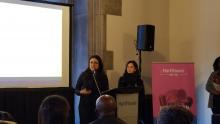Secondary menu
IHRP book launch and photo exhibition showcase resilience of survivors of sexual violence

Law students, faculty and the greater community gathered April 1, 2019, in the Hart House Debates Room for the official launch of And I Live On: The Resilience of Rwandan Genocide Survivors of Sexual Violence. This book and photo exhibit, produced in partnership with the International Human Rights Program (IHRP), feature testimonials from Rwandan genocide survivors of sexual violence after the horrific events of 1994, and showcases the survivors’ extraordinary strength, courage, and resilience.
April 7, 2019 will mark 25 years since the beginning of the 100 days of Genocide against the Tutsi in Rwanda, in which approximately one million Tutsi and moderate Hutu were killed, and an estimated 250,000 to 500,000 women and girls were raped.
Father Gustave Ineza, a Rwandan priest, opened the event with a blessing, followed by remarks from John Monahan, JD 1998, Hart House warden, who welcomed the packed room. “Twenty-five years is a lifetime ago for many of us; but for others, it’s almost unbelievable that so much time has passed,” said Monahan.
Monahan called on the audience to reflect on the stories of loss and survival, and the reality of what humankind is capable of doing to itself. He also acknowledged Canada’s own history, as a country established by the forces of colonialism, racism, and genocide of Indigenous peoples who lived on this land and formed complex social, political, economic and cultural systems long before Europeans came to North America. Monahan expressed his gratitude to the survivors who shared their stories, and in so doing continue to inform, inspire, and guide our thinking and our actions going forward.
Law students Mehak Kawatra (2L) and India Annamanthadoo (2L) took the podium to speak about their experiences as IHRP clinic students working on the development of And I Live On. India travelled to Rwanda in November 2018 with other members of the IHRP team to interview survivors and generate testimonials. She shared her reflections on the trip in the February issue of Rights Review. Mehak helped to prepare and review the survivors’ testimonials, and also supported the development of an introductory chapter focused on the incidence of conflict-related sexual violence around the world. Like India, Mehak wrote about her experience working on this project for Rights Review.
Léo Kabalisa, a founding member and vice president of Hope for Rwanda’s Children Fund (HRCF), gave the keynote address. He came to Canada from Rwanda as a refugee in December 1990, and has worked as a teacher in Canada since October 1997. He currently teaches in the York Region District School Board.
Kabalisa paid heartfelt tribute to his friends and family members who were slain during the genocide, describing himself as “just one of the few people who were lucky to escape.” He spoke about the decades of escalating tensions that led up to the genocide, and the role of dehumanizing propaganda as a precursor to ethnic cleansing. He spoke about loss and suffering and the lasting impact of the genocide 25 years on. “We live with it and we move forward… Not forget, but move forward.”
Kabalisa’s remarks were followed by a brief video message from Mama Lambert, a Rwandan genocide survivor and trauma counselor with Solace Ministries in Rwanda. “This book shows that healing is possible,” she said. “Forgiveness and reconciliation is possible.”
The event closed with a moving performance of “God Restores” by the University of Toronto Gospel Choir.
The photo exhibition is on the first floor of Hart House and will be on display until the end of May. Check out the audio stories on the exhibit’s webpage.
